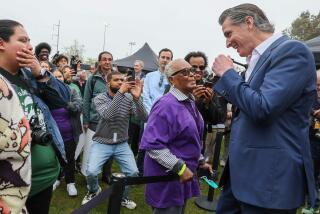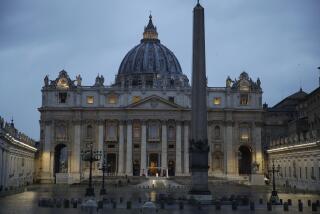Rabbis to Meet With the Pope
- Share via
Last week Jewish leaders, nationally and locally, agreed to meet with Pope John Paul II in Miami and here in Los Angeles. While the decision was carried by clear majorities, it was also marked by a distinct air of sadness and, in some quarters, cynicism.
“How can we justify meeting with the man who honored (Austria President) Kurt Waldheim at the Vatican on June 25, and who failed to speak one word at the meeting about the Nazi extermination of 6 million Jews and thousands of innocent others?” a survivor of Auschwitz bitterly asked as the Board of the Jewish Federation Council of Los Angeles was about to vote on sending its delegates to attend the Nostra/Aetate Alive Papal event on Sept. 16 at the Japanese-American Cultural and Community Center in Los Angeles.
The question remains an agonizing one even after the long-awaited meetings in Rome between Vatican officials, the Pope and nine Jewish leaders on Sept. 1. Clearly, those meetings were “warm,” “forthright,” and “productive” as most who attended have reported. Yet the damage to Catholic-Jewish relations from the Waldheim affair will require a long process of healing.
Perhaps that explains why Jewish leaders and organizations have overwhelmingly decided to meet with the Pope on his tour of the U.S. and Canada. A boycott would have closed the doors to dialogue, deeply offended many Catholic friends who have expressed their own concern at the papal audience provided to Waldheim and proven a victory for those who promote suspicion and hatred in both faith communities.
Yet what is to be gained by the symbolic and scripted meetings in Miami and here in Los Angeles? After all, these will be public gatherings. Each speech delivered will be carefully crafted and presented in the glare of world television. There will certainly be no room for private debate or hard negotiating on the outstanding issues of the Catholic-Jewish dialogue.
So why bother with such formalities?
Many of us who have been involved in Catholic-Jewish relations over the years are convinced that the forthcoming papal meetings will not only acknowledge the successes of our dialogue in the past, but will enhance its continuing goals. In particular, we are proud of our achievements here in Southern California which include priest-rabbi dialogues, joint studies on critical social and theological issues, special interreligious programs for high school students and a flourishing forum for Catholic and Jewish women.
These accomplishments are not to be taken lightly. Nor should the significance of the recent meetings in Rome be lost in the frenzy of the Pope’s visit. Out of the bitterness of the Waldheim affair have come some important new commitments from the Vatican. The announcement by Cardinal John Willebrands, president of the Commission for Religious Relations with the Jews, of an official Catholic document on the Holocaust and the historical background of anti-Semitism and its contemporary manifestations, together with the Holy See’s pronouncement that there are “no theological reasons in Catholic doctrine” which inhibit the Vatican’s complete diplomatic relations with the State of Israel, must now be underscored with great prominence. What better forum could we dream of than this papal visit and its special meetings with the Jewish community?
The fruits of the dialogue which we will celebrate with Pope John Paul II at the Los Angeles event, however, will not be narrowly Jewish. Nor is it an accident that Los Angeles was chosen for this unique interreligious convocation. The work of the Interreligious Council of Southern California as a meeting ground for Jews, Moslems, Buddhists, Hindus and Christians of every camp is a model deserving of papal recognition. By focusing on our interreligious achievements here in Southern California, the Pope will hopefully not only deepen our commitments but will foster our example in many other places.
Papal visits are, of course, largely symbolic events. Primarily they are meant to fire the souls of the faithful and strengthen the Catholic Church. Pope John Paul’s tour of the United States will conform to that purpose, but it also seeks a wider scope. In reaching out to meet with Jews and other non-Christians, the Pope is demonstrating the seriousness with which his church regards the dialogue among all faiths.
Not to have accepted such an invitation would have been a serious mistake. Sharing these meetings with Pope John Paul II will allow Jews to sustain the momentum of their particular agenda, and to participate in furthering the interreligious dialogue so critical to so many in these troubled times.
RABBI HARVEY J. FIELDS
Wilshire Boulevard Temple
Los Angeles
(Rabbi Fields is chairman of the Interreligious Committee of the Board of Rabbis of Southern California.)
More to Read
Sign up for Essential California
The most important California stories and recommendations in your inbox every morning.
You may occasionally receive promotional content from the Los Angeles Times.










